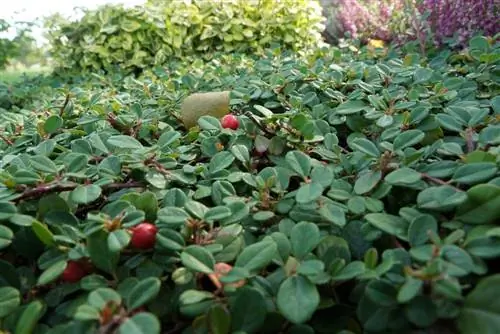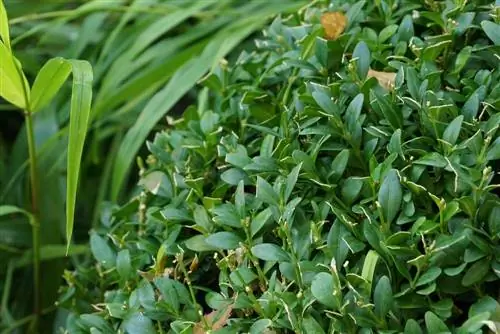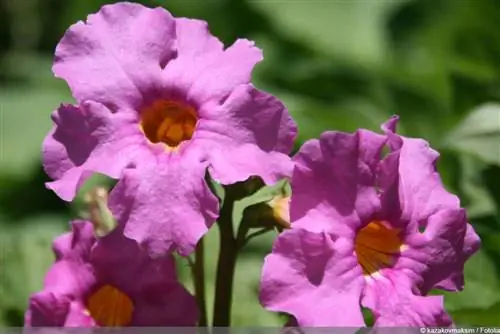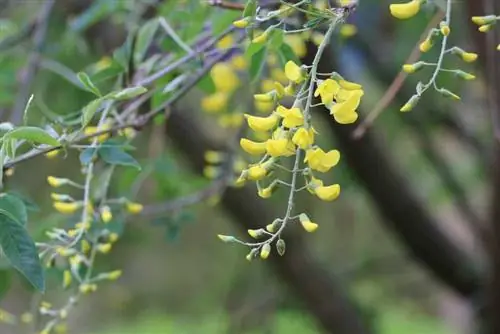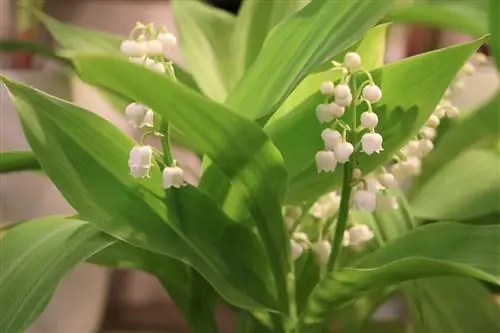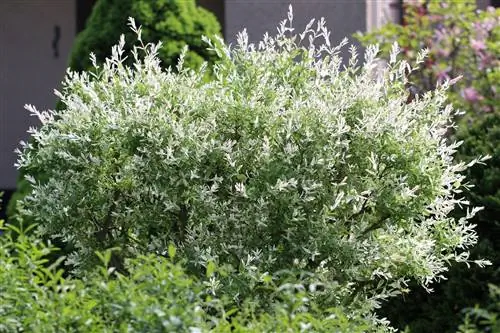- Author admin caroline@plants-knowledge.com.
- Public 2023-12-17 03:39.
- Last modified 2025-01-24 12:45.
Evergreen garden shrubs are an ornament even in winter because, unlike other plants, they do not shed their leaves. They can therefore serve as shade, wind and privacy protection all year round and are therefore extremely popular not only with hobby gardeners. So that they can show off and thrive in the garden, a few factors should be taken into account when choosing.
Low shrubs
Low evergreen shrubs that bloom and are hardy can be used as ground cover or small bed borders - but of course can also stand alone and be cultivated in a container. Well suited for these purposes are:
- Large-leaved evergreen as a ground cover in the shade
- Small-leaved evergreen as a ground cover in the shade
- Dwarf privet as a small hedge or solitary up to 100 cm high
- Snow heather or winter heather as a winter-flowering evergreen shrub for sunny locations
- Cotoneaster as a ground cover for sun to partial shade, bears white flowers and red berries
- Spindle bush as a creeping or climbing shrub for sunny to partially shaded locations
It is important for small evergreen garden shrubs to pay attention to their frost hardiness. For example, light winter protection may be advisable for small-leaved or large-leaved evergreens if the climate is very cold and harsh and the shrub is otherwise unprotected.
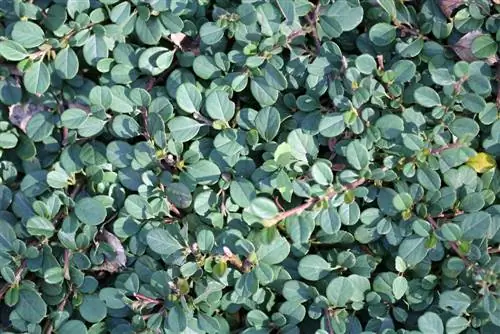
Even when growing in a bucket, it usually makes sense to wrap the planter with garden fleece to protect the roots and place it on Styrofoam or another insulating surface. This reduces the risk of frost damage. Alternatively, the evergreen shrub can be overwintered indoors in a light and cool place or cold but frost-free. When planted outdoors, it is sufficient - if necessary - to cover the evergreen bushes lightly with brushwood or straw.
Small shrubs
Like the ground-covering or very low dwarf shrubs, the evergreen small shrubs are also suitable for cultivation in containers. However, they can also be used as hedges and thus offer a slight privacy screen, provide shade or act as a boundary. Of course, they are also suitable as solitaires. Well-known and popular types of these evergreen garden shrubs include:
- Barberry, bears flowers and fruits, suitable for sunny to partially shaded locations
- Boxwood, known for its good pruning tolerance and available in numerous types, does not tolerate full sun
- Cotoneaster, requires some protection and is available in unusually colored varieties
- Privet, suitable for sunny to semi-shady locations and often used as a hedge due to its good pruning tolerance
- Cherry laurel, only does not tolerate full sun in winter when there is frost, otherwise it is undemanding in terms of versatility
- Mahonie thrives best in the sun, but is extremely tolerant of location
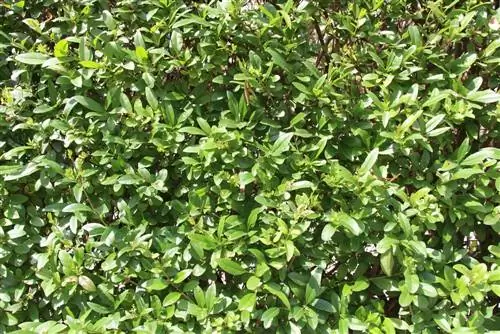
Again, protection from frost may be necessary when growing in a bucket. Overwintering indoors is not always easy or possible due to its size.
In addition, these evergreen garden shrubs often require trimmings in planters, as otherwise they can reach a height of up to three meters and corresponding widths - the maintenance effort is therefore correspondingly greater than if they were planted outdoors and can develop freely here in all directions.
Tip:
Some garden centers offer professional overwintering of larger potted plants. If the frost protection outdoors and the space in the house are not enough, there is a way to save the evergreen shrub over the winter.
Large Shrubs
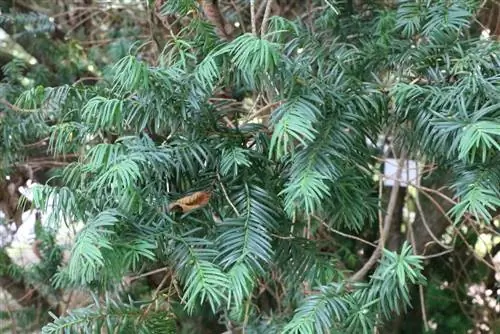
Large evergreen garden shrubs are an eye-catcher in themselves, but due to their dimensions they do not fit in the pot or in every garden. You should also make sure that they not only take up a lot of space - but also provide a lot of shade. This may not be ideal for some other crops. Anyone who plants them should therefore choose the location carefully and with foresight.
The list of large evergreen garden shrubs includes, among others:
- Yew, such as European and Japanese yew, ideal for shady and semi-shady locations
- Golden privet, which needs a lot of sun for its golden color
- Tree of life, also known as thuja, is available in green-leaved but also yellow and white-colored versions - the location depends on the leaf color
- Olive willow, thrives best in sheltered locations in the sun or light shade
- Mother-of-pearl shrub, also known as Kolkwitzia, needs plenty of sun to produce its flowers
- Scrub Scots pine, tolerates sun to shade and can easily cope with urban climates and exhaust fumes
The demands on the location and the care are very different, so you should do good research in advance. The advantage of this is that you can find the right large, evergreen garden shrub for every location.
Fast-growing species
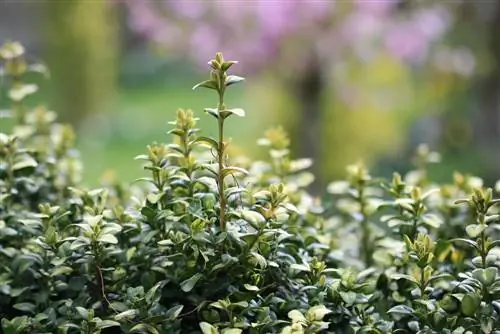
If a fast-growing privacy screen is desired, some of the evergreen garden shrubs are particularly suitable. These include, among others, breeding forms of:
- Barberry
- Boxwood
- Cotoneaster
- Cherry Laurel
- Mahony
These are also ideal for closing gaps, for example - but without the right trimmings, they can also “outgrow” other plants in a very short time. Anyone who decides to do this should therefore be aware of the possible maintenance costs of regular cuttings and of course also select the location accordingly for growth.
Alternatives
Suitable alternatives to the largely deciduous evergreen shrubs can in some cases also be found among the conifers. Some of these plants, such as the arborvitae or cypresses also known as thuja, also grow very quickly and hardly need to be pruned or limited. This can be a significant advantage compared to other garden shrubs. Especially if they are in hard-to-reach corners of the garden or there is little time left for care.
Tip:
Caution is advised, especially with conifers, because garden clubs and some communities only allow them up to a certain height and may have to be “cut”. Some gardeners find the missing tip visually disturbing.
Toxicity
Some of the evergreen garden shrubs mentioned, including the arborvitae mentioned several times but also the yew, boxwood and privet, contain plant poisons. This makes them less susceptible to pests, but also a potential danger to animals and children.
Especially the fruit-bearing species can tempt you to snack with their brightly colored berries. Households and gardens with small children and animals should therefore pay close attention to the toxicity of the shrubs when choosing, and if necessary, switch to alternatives or protect the plants accordingly from access by children and animals.

